Women’s History Month: Anniversary of the Triangle Shirtwaist Factory Fire
 This #WomensHistoryMonth Friday, we recognize March 25th as the 106th anniversary of the tragic Triangle Shirtwaist Factory fire in New York City. A devastating 146 immigrants of Jewish and Italian descent lost their lives, 123 of them being young women and teenage girls. As the industrial revolution took full force, inhumane working conditions were the standard in these spaces. Overcrowded factories, dangerous machinery, long hours with insufferable wages were amongst the issues that the garment industry faced.
This #WomensHistoryMonth Friday, we recognize March 25th as the 106th anniversary of the tragic Triangle Shirtwaist Factory fire in New York City. A devastating 146 immigrants of Jewish and Italian descent lost their lives, 123 of them being young women and teenage girls. As the industrial revolution took full force, inhumane working conditions were the standard in these spaces. Overcrowded factories, dangerous machinery, long hours with insufferable wages were amongst the issues that the garment industry faced.
There were some groups such as the International Ladies’ Garment Workers’ Union (ILGWU) and the Women’s Trade Union League (WTUL) that fought for better working conditions and protective legislation. A year prior to the fire, the largest women’s strike in American history took place in order to fight for a multitude of things, including union representation and safer working conditions. The owners of the factory, Max Blanck and Isaac Harris who initially disregarded the demands of the women workers gave in after eleven weeks of the women being on strike – without granting them the protection of a union. Many feared that raising their voices would strip them of their jobs and they needed financial security. Thus, harsh conditions continued as the women were further exploited.
On March 25th 1911, a fire broke out in the top floors of the building they occupied. The owners had the doors locked to the stairwells and exits, resulting in the workers perishing in the fire and or escaping through the windows and falling to their death. It became one of the largest and deadliest industrial disasters in New York City and in U.S. history.
As a result, New York City took necessary measures and eventually became a model to the rest of the country in order to protect their citizens in the workforce by stronger legislation, and cultivating labor, health and safety advocates.
As we move forward today, and combat the injustices that marginalized women face in these industries, we want to remind everyone that the intersections of health and safe working conditions is reproductive justice.
